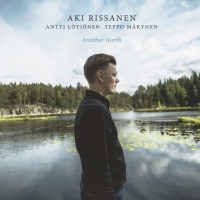Home » Jazz Articles » Catching Up With » The Dazzling Alexis Cole
The Dazzling Alexis Cole

Why am I inspired? Because of the interplay with the musicians, the audience, the sound.
—Alexis Cole
All About Jazz: You've talked about how music is a way of channeling the divine. I find that a lot of singers talk about receiving inspiration from a "meta" place that could be called the divine, or spirit. What is your experience of this?
Alexis Cole: Singing is a direct pathway to feel the power of the spirit. When I'm performing, I try to actively or subconsciously bring in that aspect. Moments [of spiritual inspiration] can happen in any situation where there are hungry hearts, and there is food in the music.
AAJ: When you're scatting, you're clearly an inspired singer whose ideas are coming from somewhere. Where do think that somewhere is?
AC: I do feel that it's my most connected moments in general when I scat. I don't scat on every song, so if I'm going to take a solo it's because I feel inspired to take a solo. Why am I inspired? Because of the interplay with the musicians, the audience, the sound. And when you ask what am I tapping into—I feel like I'm drawing from my ancestors. My grandmother was a great singer, and her mother was a singer. And my father is such an inspired singer and pianist and composer. Also, I lived in India for a while, where...you only really become a musician if you're from a musician family.
AAJ: What brought you to India?
AC: I had the opportunity to study Indian classical singing there through a [two-month residency in Mumbai]. Roseanna Vitro and Leni Stern are two other singers you might know who did it.
AAJ: I've heard Roseanna and other singers like Debra Latz incorporate Indian classical singing into their scats. Do you?
AC: Yeah, I do it. You can't help it once you have that sound in your ear. My Christmas CD [The Greatest Gift] is the only time when I've done a fusion thing with Indian instruments, though, on the song "Rise Up, Shepherd, and Follow." At the end I do overtone singing, which I learned right before that recording session. I'm proud of that.
AAJ: How is Indian classical vocal technique different from Western classical technique?
AC:: The main difference is the usage of head voice. They have that very forward, higher tone. A lot of Western singers have a break in their voices, but I don't think any Indian singers do because of the very forward way that they sing.
AAJ: You've also spent a lot of time working in Japan. How did that come about?
AC: I was on my way back from Ecuador, where I'd been teaching at the Berklee College of Music. I was visiting my parents in Miami, and... [bassist] Gene Perla [sent an email] asking me if I knew anybody who'd be available to sing in a lounge in Japan for three months, starting in three weeks. I just said that I'd love to do it...and I got the job. I did four three-month contracts in Japan over 2 ½ years.
AAJ: You were a singer in the Army for about seven years. Most jazz singers probably don't know about these jobs. How did you hear about it?
AC: [Jazz singer] Nancy Marano told me about that opening. So in 2009, while I was in Tokyo, I took the ASFAB exam and the week that I got back from Tokyo I auditioned for the West Point Band. Then a few months later, I was in basic training, and I sang with the Army until October 2015.
AAJ: When you enlisted, did you know how long you'd be in the Army?
AC:: There's a minimum of three to four years per enlistment, and you have the option to reenlist every couple of years. If you aren't going to reenlist, they need to start advertising for your job and hire somebody and send them to basic training.
AAJ: A steady singing gig with great musicians, long-term benefits, and lots of travel sounds pretty appealing.
AC:: It is. The military just changed the retirement structure, too, so that anybody who serves gets something. With my seven years in, I could have gotten some pension [under the new structure]. But I have VA (Veterans Adminstration) healthcare for the rest of my life—everybody who serves at all gets that.
AAJ: Did your teaching position at SUNY Purchase came in right after you left the Army?
AC:: They overlapped for a while. [Getting the SUNY Purchase position] was amazing, too, because I was living in Peekskill at the time, near West Point, and transitioning out of my role in the Army. As part of that they let me go one day a week to do the SUNY job, where I had about eight students that first year.
AAJ: What's the SUNY program like for singers and what is your role there?
AC: At SUNY Purchase our vocal students are mainstreamed with the other jazz students. My role there is to teach the voice lessons...and give my students support for their other classes, too, like theory, ear training, and piano practice. But with my classical voice technique experience, all my students become good singers first. That's really important to me.
AAJ: It sounds like you have a pretty full schedule. Do you have any big projects coming up?
AC: I'm going to be releasing two of my CDs on [Japan-based] Venus Records in the U.S. One of the CDs is called Close Your Eyes, The Sultry Sound Of Jazz, and the other is You'd Be So Nice to Come Home To. I'm also working with Tetsuo Hara [owner of Venus Records] to produce a new Brazilian album. After that, my next big artistic ambition is to produce a big band CD. I have all this material that was written for me while I was in the Army band. This project would be to document all the work that I've done over the last decade.
Tags
Interview
Suzanne Lorge
United States
New York
Roseanna Vitro
Leni Stern
Debra Latz
Gene Perla
Nancy Marano
PREVIOUS / NEXT
Support All About Jazz
 All About Jazz has been a pillar of jazz since 1995, championing it as an art form and, more importantly, supporting the musicians who make it. Our enduring commitment has made "AAJ" one of the most culturally important websites of its kind, read by hundreds of thousands of fans, musicians and industry figures every month.
All About Jazz has been a pillar of jazz since 1995, championing it as an art form and, more importantly, supporting the musicians who make it. Our enduring commitment has made "AAJ" one of the most culturally important websites of its kind, read by hundreds of thousands of fans, musicians and industry figures every month.























